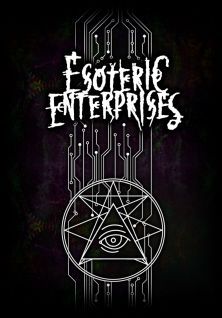Esoteric Enterprises - Complete
 |
Picture the adventuring party of most old-school games. A band of thugs¸ occultists¸ criminals¸ weirdos and outcasts who¸ rather than settle into normal society¸ risk everything exploring the dark¸ dangerous places of the world. Perhaps they will become rich and powerful¸ perhaps they die unceremoniously.
Keep this same adventuring party¸ and picture their equivallent in the modern day. A world with police¸ the internet¸ chain stores... The same band of thugs¸ occultists¸ criminals¸ weirdos and outcasts drift into the underworlds of organised crime and the esoteric.
This¸ then¸ is the premise of Esoteric Enterprises: the occult exists in a dangerous black market¸ where organised criminals traffic in magical grimoires and relics alongside narcotics and weapons. Hidden from the public eye¸ various gangs¸ cults and covens struggle for influence and resources in the dark tunnels beneath every city. And beneath that¸ stranger things lurk; inhuman creatures turn their cold gaze on the mortals who intrude on their subterranean realm.
Welcome to the Occult Underworld
This book details all the rules you'll need to play games as an occult or criminal gang in the undercity. They're based on the standard framework seen in most old-school games¸ adapted to work in a modern-day urban fantasy setting.
Character creation is quick and streamlined. Characters are members of the occult or criminal underworlds¸ and might be magicians¸ mad scientists¸ cultists¸ urban explorers¸ career criminals or even inhuman monsters. Spells¸ equipment and character perks are all tailored to suit an urban fantasy setting.
Combat is fast and brutal¸ with dirty fighting emphasised and the potential to suffer horrible injuries. Away from combat¸ there are subsystems for interacting with various underground contacts¸ medical and magical experiments¸ exploring the undercity¸ and common criminal activity. Since the game uses treasure-for-XP¸ wealth and status are abstracted into being a function of character level.
Magic is rendered a risky enterprise. Magicians either cast previously memorized spells (in the case of occultists) or pray to a patron to grant them power (in the case of mystics). While a careful occultist can avoid disaster by limiting their activity¸ a mystic's magic is always at the whims of their patron¸ and every spell cast might result in complications. And¸ of course¸ the temptation to experiment with magic is always there¸ with consequences that can range from the surreal to the apocalyptic.
The Spook class¸ meanwhile¸ covers all non-human PCs. Each such spook is a unique creature¸ combining their basic nature (such as undead¸ ghostly¸ or artificial beings) with a selection of minor powers (such as blood-drinking¸ hypnosis or resistance to pain) to reflect the creature's capabilities.
The greater part of the book¸ however¸ is made up of tools and resources for the GM. This begins with a short section of GMing advice¸ describing the game's intended playstyle and giving tips for managing scenes¸ handling darker content and using randomness to create emergant narratives.
After this¸ the meat of the GM's section deals with actually creating and running a setting for the game. There are systems to create a network of different underworld factions¸ tracking their relationships with one another and events in the underworld. Likewise¸ there are methods to track the attention PCs are drawing from the police¸ as well as their alliances¸ rivalries¸ and grudges with other players in the underworld.
Likewise¸ a system is given for creating the undercity that PCs explore - essentially a small megadungeon b